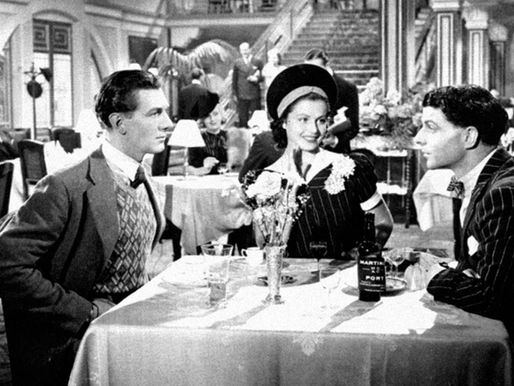top of page
Search
Film Reviews
Reviews of films from 1930's through to 1999.


The Fallen Idol (1948)
The Fallen Idol (1948) is a quiet masterpiece of psychological tension, moral ambiguity, and childhood perception. Directed by Carol Reed in one of his finest collaborations with writer Graham Greene (preceding their celebrated The Third Man), the film is a study in how innocence and misunderstanding can transform the banal into the tragic.

Soames Inscker
5 min read


The Stars Look Down (1940)
The Stars Look Down (1940) is a compelling, socially conscious British drama that grapples with class conflict, industrial exploitation, and moral idealism.

Soames Inscker
5 min read


Odd Man Out (1947)
Odd Man Out is a remarkable film that defies easy classification—part noir, part political thriller, part poetic tragedy. Directed by Carol Reed, it was his first major success before The Fallen Idol (1948) and The Third Man (1949), and in many ways laid the stylistic and thematic groundwork for those later masterpieces.

Soames Inscker
5 min read


The Young Mr Pitt (1942)
Released during the darkest years of World War II, The Young Mr. Pitt is a patriotic historical drama that draws a resonant parallel between Britain's 18th-century struggle against Napoleon Bonaparte and its 20th-century fight against Adolf Hitler.

Soames Inscker
5 min read


The Way Ahead (1944)
Released in 1944, as World War II continued to engulf Europe, The Way Ahead stands as a poignant example of wartime British cinema—simultaneously a morale booster, a subtle piece of propaganda, and a genuinely moving character drama.

Soames Inscker
4 min read


Night Train To Munich (1940)
In the fraught lead-up to World War II, British cinema responded to rising geopolitical tensions with a wave of clever, patriotic, and suspenseful thrillers. Night Train to Munich (1940), directed by Carol Reed, is a standout in this cycle.

Soames Inscker
4 min read


Trapeze (1956)
Carol Reed’s Trapeze (1956) is a lush, emotionally layered drama set against the dazzling backdrop of a Parisian circus. Beneath the sequins, the tented glamour, and death-defying aerial stunts lies a story about ambition, desire, loyalty, and human frailty.

Soames Inscker
4 min read


Oliver (1968)
Carol Reed’s Oliver! is a sweeping, emotionally resonant musical adaptation of Lionel Bart’s 1960 West End production, which itself reimagines Charles Dickens’ seminal 1838 novel Oliver Twist.

Soames Inscker
4 min read


The Best Years of Our Lives (1946)
Released in 1946, The Best Years of Our Lives stands as one of the most powerful and poignant films ever made about the effects of World War II on ordinary Americans. Directed by William Wyler, the film takes an unflinching look at the lives of three World War II veterans returning home to small-town America after the war, exploring their struggles with reintegration into civilian life and the emotional, psychological, and societal costs of war.

Soames Inscker
6 min read


West Side Story (1961)
When West Side Story was released in 1961, it was immediately hailed as one of the most ground-breaking and electrifying musicals in cinematic history. Directed by Robert Wise and choreographed by Jerome Robbins, this film adaptation of the Broadway hit set to Leonard Bernstein's iconic music and Stephen Sondheim’s lyrics fused high art with popular entertainment. Its gripping story, vibrant choreography, memorable score, and innovative use of film techniques combined to crea

Soames Inscker
6 min read


Foreign Correspondent (1940)
Released in 1940, Foreign Correspondent marks a fascinating moment in Alfred Hitchcock’s career, situated between his early British work and his later Hollywood masterpieces. As his first purely American film (though it was still made under British filmmaking conventions), Foreign Correspondent reflects the director’s evolving cinematic style, blending thrilling suspense with sharp political commentary.

Soames Inscker
5 min read


Love Story (1970)
At its core, Love Story is a simple, tragic romance. Oliver Barrett IV (Ryan O’Neal) is a privileged, Ivy League law student from a wealthy, emotionally distant family. Jennifer Cavalleri (Ali MacGraw) is a working-class music student with a sharp tongue and a fierce intellect. They meet at Harvard, fall in love, and defy Oliver’s overbearing father (Ray Milland) by marrying against his wishes.

Soames Inscker
3 min read


Trading Places (1983)
The premise is simple but potent: two wealthy, manipulative brothers—Duke & Duke (Don Ameche and Ralph Bellamy)—make a bet to see whether a person’s character is shaped more by nature or nurture. To test their theory, they orchestrate a life-swap between two men at opposite ends of the socioeconomic spectrum.

Soames Inscker
3 min read


Marathon Man (1976)
The story centres on Thomas "Babe" Levy (Dustin Hoffman), a Columbia graduate student and passionate long-distance runner who is unknowingly drawn into a deadly international conspiracy. His brother Doc Levy (Roy Scheider), a covert government agent, is murdered, and Babe soon finds himself pursued by sinister figures tied to the Nazi past.

Soames Inscker
3 min read


Beverley Hills Cop (1984)
When Beverly Hills Cop was released in 1984, it didn’t just cement Eddie Murphy as a major Hollywood star—it helped redefine what an action-comedy could be. Equal parts crime thriller and laugh-out-loud comedy, the film captured the zeitgeist of the 1980s, blending gritty urban realism with the sun-soaked gloss of Beverly Hills, all anchored by Murphy’s dynamic, high-voltage performance.

Soames Inscker
3 min read


Hope and Glory (1987)
Hope and Glory is John Boorman’s deeply personal, semi-autobiographical account of his childhood growing up in London during the Blitz of World War II. Unlike many wartime dramas that focus on trauma and heroism in the battlefield, Boorman’s film stays home, capturing the chaos, absurdity, and strange joys of life during war through the eyes of a young boy.

Soames Inscker
5 min read


A Nightmare on Elm Street (1984)
A Nightmare on Elm Street (1984) is more than just another slasher film. It’s a psychologically potent blend of supernatural terror, teen vulnerability, and imaginative horror that transformed the genre and introduced one of cinema’s most iconic villains: Freddy Krueger.

Soames Inscker
5 min read


Driving Miss Daisy (1989)
Driving Miss Daisy is a quiet, character-driven film set in the American South, spanning the years from the late 1940s to the early 1970s. At its heart, it is the story of an unlikely friendship between Daisy Werthan, a fiercely independent, aging Jewish woman from Atlanta, and Hoke Colburn, her African American chauffeur.

Soames Inscker
4 min read


The Killing Fields (1984)
The Killing Fields (1984), directed by Roland Joffé and produced by David Puttnam, is a powerful and harrowing film based on real events surrounding the Cambodian genocide under the Khmer Rouge regime.

Soames Inscker
4 min read


The Little Mermaid (1989)
The Little Mermaid (1989) is not merely an animated film—it is a landmark in cinematic and animation history. Often credited with launching the “Disney Renaissance,” the film resurrected the fortunes of Walt Disney Animation Studios after a period of creative and financial stagnation in the 1970s and early '80s.

Soames Inscker
5 min read
bottom of page


